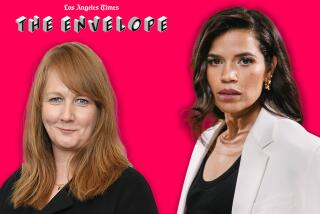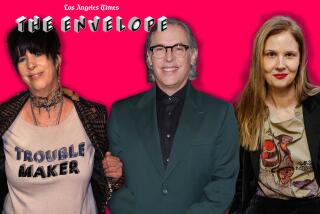Indie Focus: Fateful intersections in ‘Vox Lux,’ ‘Ben Is Back’ and ‘Mary Queen of Scots’
Hello! I’m Mark Olsen. Welcome to another edition of your regular field guide to a world of Only Good Movies.
This was quite a week in movie-ville. More succinctly, this past Thursday was quite a day. Early L.A.-time that morning, the Golden Globes announced the nominations for their upcoming ceremony.
Josh Rottenberg made sense of all the nominations, while Glenn Whipp looked at the strong showing for “Vice,” a portrait of former Vice President Dick Cheney, and how it just happened to be landing at the same time that former President George H.W Bush was being mourned.
Amy Kaufman spoke to “Can You Ever Forgive Me?” actor Richard E. Grant and ”Bohemian Rhapsody” actor Rami Malek. I interviewed “Vice” writer-director Adam McKay, “If Beale Street Could Talk” writer-director Barry Jenkins and “The Favourite” actress Rachel Weisz.
Jen Yamato spoke to John M. Chu, Michelle Yeoh and Constance Wu about the nominations for “Crazy Rich Asians” and the impact the film is having on Asian representation in Hollywood.
And then, Thursday night, comedian Kevin Hart, who had been announced as host of the upcoming Oscars only days before, dropped out after controversy erupted over homophobic statements he had made in the past and his initial refusal to apologize for them. Like I said, it’s been a week.
We also published another of our Envelope roundtable conversations, this time with six of the season’s most notable actors. It was a rollicking, high-energy talk that had some moments of startling sincerity when we brought together John C. Reilly for “Stan and Ollie” and “The Sisters Brothers,” Michael B. Jordan for “Black Panther” and “Creed II,” Viggo Mortensen for “Green Book,” Steven Yeun for “Burning,” Willem Dafoe for “At Eternity’s Gate” and Ethan Hawke for “First Reformed.”
For information on upcoming events as part of our Envelope Live series, go to events.latimes.com/screenings.
‘Vox Lux’
Written and directed by Brady Corbet, “Vox Lux” is an ambitiously heady view of pop culture and celebrity and its relation to contemporary world events. In the film, a teenage girl named Celeste launches to international stardom as a singer after being wounded in a school shooting. Natalie Portman plays the singer after she has grown up into being a tempestuous, troubled star, in a performance that is by turns fizzy, funny, terrifying and heart-wrenching.
Reviewing the movie for The Times, Justin Chang wrote “The demons that Celeste wrestles with are nothing new: various forms of substance abuse, a monstrously indulged ego, a stream of men who range from opportunistic to predatory. But the movie, harsh as it may be in its view of Celeste and what she represents, also knows better than to sell her short .… Her triumph may be the product of a Faustian bargain, but ‘Vox Lux’ more than gives the devil her due.”
I sat down with Portman and Corbet, and also spoke by phone to co-stars Jude Law, Stacy Martin and Raffey Cassidy, to discuss the movie’s ambitions of capturing something specific about right now. “I think this film certainly has a lot of echoes in terms of the time we’re living in,” said Portman. “It is a very unstable time with rapidly changing technology, rapidly changing media and culture and it definitely affects us. This has that aura of the moment we live in, in a way that I don’t feel like I’ve ever worked on before in a film.”
Reviewing for the New York Times, Manohla Dargis wrote, “Portman’s performance puts an exclamation point on Celeste’s every gesture, word and saunter. Everything about the character is outsized, extreme, including an accent that sounds like it’s been lifted from a New York cabby in an old Hollywood comedy. Celeste is by turns opaque and transparent .… She looks as if she has become her own mask.”
For The New Yorker, Richard Brody added, “Portman is an actor of contradiction, one of the most dramatically expressive performers of her generation, a true classic movie star: the kind whose tremendous emotional radiance flashes brilliantly even in repose, the kind that depends more upon her mere presence than upon her performance .… Her voice isn’t her most distinctive instrument. Rather, her speech is like a kind of background music to the singular power of her facial expressions, her gestures, her gaze, her presence. She’s one of the great physical actresses of this era.”
At Vulture, Emily Yoshida wrote that the movie “is about the burden that both pop music and teenage girls bear in the face of national tragedy, but it feels fundamentally alienated from the human body — we see the brutality of its expectations and pressures, but we don’t feel the pain. As a story of popular art born in the crucible of violent trauma, it’s a fantastic, wildly ambitious idea; as a filmed drama with human characters, it’s confoundingly executed at every turn. ‘Vox Lux’ is a failure, but one I can’t stop thinking about.”
‘Ben Is Back’
Julia Roberts stars in the drama “Ben Is Back” as a mother struggling to help her son continue his recovery from an addiction to painkillers after he returns home from rehab. Written and directed by Peter Hedges, the film also stars his son, acclaimed young actor Lucas Hedges, as the young man.
In his review for The Times, Justin Chang wrote, “There is something at once laudable and faintly risible about the filmmakers’ decision to roll a home-for-the-holidays heart-tugger, a substance-abuse melodrama, a nocturnal thriller and a Julia Roberts crowd-pleaser into a single movie .… It’s both poignant and subversive to see Roberts’ mega-watt smile — once the most reliable bliss-out generator in the movies — suddenly flicker and die, in those moments when Holly realizes everything may not turn out OK.”
The Times’ Amy Kaufman sat down with Roberts for lunch, to discuss not only “Ben Is Back” but also her new television series “Homecoming.” On her reputation for being very selective about the roles she chooses, Roberts said her representatives never talk her into things, “Oh, my agents would never talk me into a project. Why do I want to do what they want to do? They bring me things and I consider them and I make my decisions.”
For Tribune News Service, Katie Walsh wrote, “Roberts gives one of her most sensitive and searching performances yet, and her face is her most expressive tool — her wide grin at the sight of her son, her panic and despair at the smallest transgressions .… Peter Hedges has crafted an exquisitely devastating family story for the opiate era that quietly asks us to do the same.”
‘Mary Queen of Scots’
Written for the screen by “House of Cards” creator Beau Willimon and directed by Josie Rourke, a theater veteran making her film debut, “Mary Queen of Scots” tells the story of Mary Stuart (Saoirse Ronan) and Elizabeth I (Margot Robbie) and how circumstances, and the politics and treacheries of their respective courts, kept them at odds.
In his review for The Times, Kenneth Turan wrote, “It may never have happened, but the meeting between Mary and Elizabeth that closes the film is its unchallenged highlight, with both actresses, who had never seen each other in costume and makeup until the moment of filming, brilliantly going one-on-one against each other like basketball phenoms playing for all the marbles.”
The Times’ Jen Yamato spoke to Rourke, Ronan and Robbie about the project. Of the movie’s reflection of contemporary dynamics between men and women and power, Rourke said, “I’ve done a ton of Shakespeare plays, and we would never look at an old play and not try and work out how that speaks to the present. And I think sometimes an old story is the best way to talk about what is happening right now.”
At Slate, Inkoo Kang wrote that, while the film “pays lip service to how bad it is to pit women against each other, that’s exactly what the movie is structured to do, cross-cutting between the two queens in similar poses and compositions and thus asking us to compare and contrast them. The result is the self-contradictory feminism of a Taylor Swift video. If Marie Antoinette’s error was saying, ‘Let them eat cake,’ ‘Mary Queen of Scots’ is to try to have it, too. “
At Time, Stephanie Zacharek reviewed the movie paired with another recent subversive period piece, “The Favourite.” Of “Mary” she wrote, “You probably know how this story ends, but Rourke makes the getting-there suspenseful even so. And both Ronan and Robbie are superb: they have just one scene together, but their characters’ dual isolation and increasing rancor, playing out in twin kingdoms so close to each other and yet so far, becomes a force of its own — a potential kinship that becomes a destructive fireball.”
Email me if you have questions, comments or suggestions, and follow me on Twitter @IndieFocus.
SIGN UP for the free Indie Focus movies newsletter »
More to Read
Only good movies
Get the Indie Focus newsletter, Mark Olsen's weekly guide to the world of cinema.
You may occasionally receive promotional content from the Los Angeles Times.







